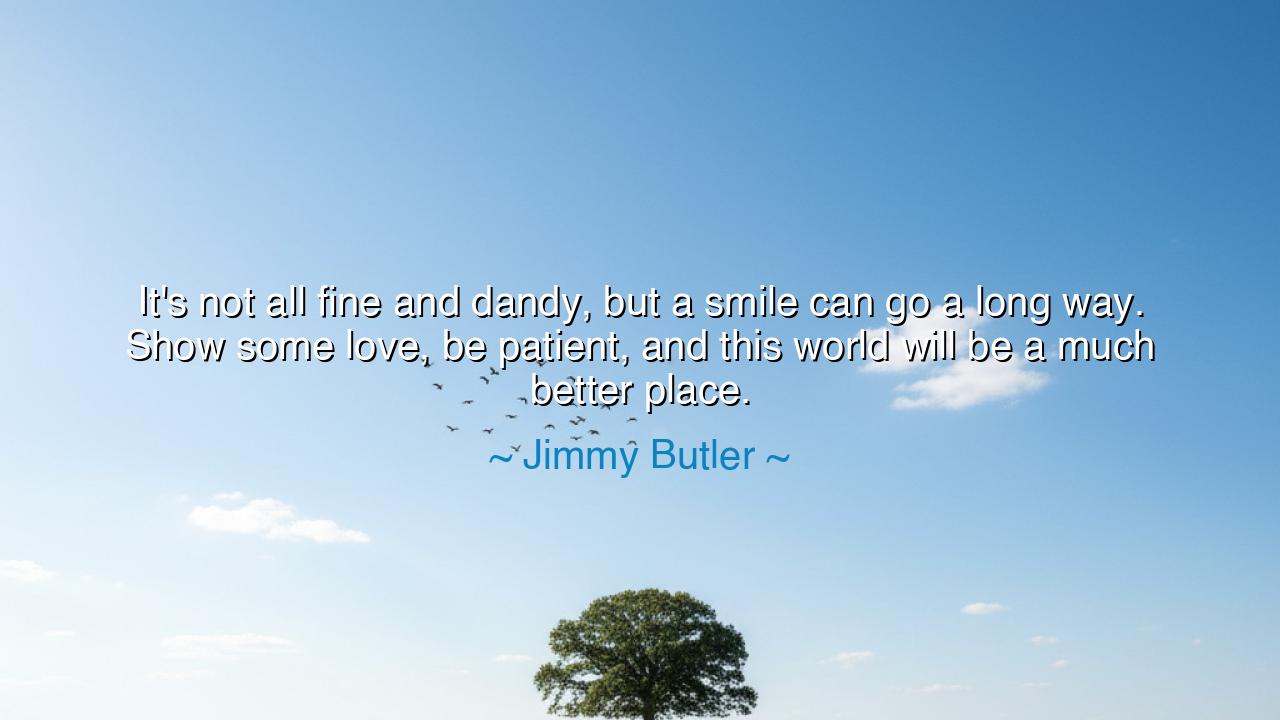
It's not all fine and dandy, but a smile can go a long way. Show
It's not all fine and dandy, but a smile can go a long way. Show some love, be patient, and this world will be a much better place.






Hear now the words of Jimmy Butler, warrior of the hardwood, who has endured both triumph and trial: “It’s not all fine and dandy, but a smile can go a long way. Show some love, be patient, and this world will be a much better place.” Though brief, these words carry the weight of ancient wisdom, for they teach us how to walk through a broken world with courage and compassion. Butler does not veil life’s hardships—he confesses that it is not “fine and dandy.” Yet he points us to weapons of the spirit: the smile, the act of love, the strength of patience. These are the tools by which humanity can endure and overcome.
The origin of this truth lies in the eternal conflict between despair and hope. From the beginning of time, mankind has wrestled with hardship—famines, wars, betrayals, losses too deep to number. Yet in every age, there arose men and women who answered sorrow not with bitterness, but with kindness. Butler stands in this lineage, reminding us that though we cannot escape suffering, we can choose how we meet it. The smile becomes a small but radiant defiance, a reminder to others that hope yet lives.
The ancients themselves knew the strength of such gestures. In Rome, the Stoics taught that though fate may strike, the soul can remain unconquered. A man might be beaten, starved, or cast into exile, but if he bore himself with dignity and a calm countenance, he remained victorious. The smile, then, is not naivety—it is defiance, the visible mark of one who refuses to let hardship rule his spirit. Butler, in speaking to his generation, echoes this same wisdom: that a simple smile can reach farther than a sword.
History, too, bears witness. Consider the story of Nelson Mandela, who after twenty-seven years in prison emerged not with hatred but with forgiveness. His patience became his power, his love transformed a divided nation. The man who had every reason to curse the world chose instead to embrace it, and by doing so, he altered the destiny of millions. Like Butler’s teaching, Mandela proved that even in the harshest of lives, gentleness and compassion are the weapons that endure.
Butler’s words also remind us that the world itself is not healed in an instant. To say “be patient” is to confess that change is slow, that goodness takes root over time, that we must persist even when we see little fruit. Yet patience is not weakness—it is the endurance of the strong. Just as the farmer waits for the harvest, so must we wait for the fruit of kindness, knowing that every smile, every act of love, waters the soil of tomorrow.
The lesson, then, is both personal and universal. On the personal level, you have the power to alter the course of another’s day. A smile to a stranger, a word of kindness to the weary, an act of patience toward the difficult—these are no small things. They ripple outward, unseen, carrying hope where despair would otherwise reign. On the universal level, if many live this way, the world itself will bend toward goodness. One act of love may not seem enough, but countless acts together forge revolutions of the heart.
Therefore, beloved, let this be your practice: do not pretend life is perfect, but meet its imperfections with courage. Wear the smile as your banner, show love as your offering, wield patience as your strength. In doing so, you become a bearer of light, a healer of wounds, a builder of a better world. And when your days are told, may it be said of you that you carried Jimmy Butler’s wisdom into the marrow of your life—that though it was not all fine and dandy, you smiled, you loved, you endured, and you made the world better for those who walked beside you.






AAdministratorAdministrator
Welcome, honored guests. Please leave a comment, we will respond soon